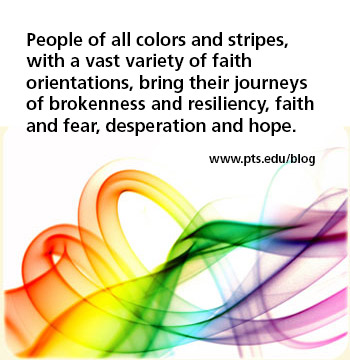Shannon is having sleepless nights, is short with her kids, and has even scared herself from time to time as thoughts of suicide have floated across the landscape of her mind. As a minister in a respectable denomination, she realizes that the words of grace and pardon she proclaims week after week don’t seem to penetrate her own soul even as she hopes them for her beloved sheep.
Michael is in a 12-step program where he is trying to “fake it until he makes it” and is working diligently to change his “people, places, and things”. But try as he might, he can’t quite believe in the higher power that is supposed to be keeping him sober. That higher power of his youth, that pie in the sky Santa Clause figure with a disapproving glare who rains on the just and who has let him down one too many times. Like that time that his father left his mother to raise three small children on her own in spite of Michael’s desperate, but futile, cries to God that his father would return. Michael believes that his very sobriety depends on an embrace of that God and yet he finds himself no longer able to go there.
These people are fabricated in my mind. Or more accurately said, they are bits and pieces of the 100 different people who grace the halls of the Pittsburgh Pastoral Institute (PPI) every day, wrestling with the very place that theology and mental health meet. People often ask us what “spiritually integrated treatment” means. They wonder what PPI does that is unique from secular or Christian counseling. It’s a terribly challenging question but one that I believe finds its focus in the dual MDiv/MSW degree program at Pittsburgh Theological Seminary and the University of Pittsburgh School of Social Work from which I (and many of the other therapists at PPI) have proudly graduated.
Through my seminary education, I learned how individuals construct their understanding of God even as my own thinking about God was challenged to be bigger and more expansive than I previously knew possible. Seminary grounded me deeper in my sacred tradition and deepened the value I place on the power of ritual even as I learned to embrace the traditions and rituals of others. My social work education taught me how our lives are lived in systems, how change comes about in the human psyche, and how human services can function as agents of grace in the world in ways that most churches currently only dream about. The unique coupling of these disciplines creates therapists and practitioners like myself who can journey with people from despair to hope as they weave in and out of the personal and conceptual landscapes of life, and family and sacred community, and faith and social action, and responsibility and connectedness.
People of all colors and stripes, with a vast variety of faith orientations, bring their journeys of brokenness and resiliency, faith and fear, desperation and hope, to the Pittsburgh Pastoral Institute. This is spiritually integrated treatment. Thanks be to the joint MDiv/MSW degree program for equipping me so well to live out this call to the world.
Michelle Snyder, LCSW is a 2009 graduate of the joint MDiv/MSW degree at Pittsburgh Theological Seminary. She currently serves as executive director at Pittsburgh Pastoral Institute and oversees The Center for Clergy and Congregational Care.

